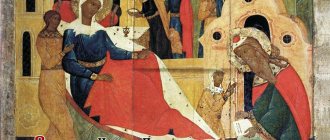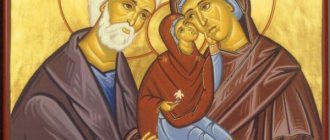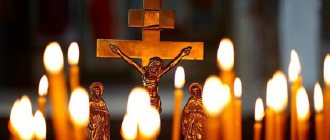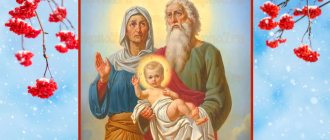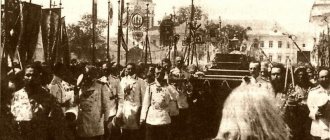Demetrius Saturday, which in 2022 is celebrated on November 7, is an Orthodox tradition to remember deceased parents, relatives and all those who suffered for the Orthodox faith. On Memorial Day, a special tribute is paid to the memory of departed parents.
In His fifth commandment, the Lord said that we are all obliged to honor our parents, living and dead, so that the days of our children and grandchildren on earth will be extended.
In Orthodoxy there are special days when the dead are remembered
The history of the emergence of Dmitrievskaya parental Saturday
According to Archbishop Demetrius, it was the establishment of Demetrius Saturday that contributed to the abolition of pagan funeral rites - funeral feasts. Triznas were served by the pagans during the burial of the deceased, during which ritual dances, songs and even warrior competitions were performed. The deceased was burned on a ritual pyre, around which funeral feasts were then held, which later turned into wakes.
The Day of Remembrance of the Dead in early November was established by the Grand Duke Dmitry Donskoy himself, and Sergius of Radonezh blessed this undertaking.
In 1380, the battle took place on the Kulikovo Field, in which several hundred thousand Russians and two monks died, who were buried under the walls of the Trinity-Sergius Monastery. In memory of the fallen soldiers, Dmitry Donskoy proposed to celebrate the day of remembrance before the feast of St. Demetrius of Thessaloniki.
This proposal was accepted, because the Russian victory cost the lives of thousands of fathers, husbands and sons who were mourned in their families. Demetrius Saturday is celebrated on the eve of the day of memory of the great Demetrius of Thessaloniki, November 8. Saturday Parents' Day is celebrated on the Saturday closest to this holiday.
For information! On November 4, the Orthodox world celebrates the day of the icon of the Mother of God; if this day coincides with parental Saturday, it is moved to the last Saturday of October.
When are Parents' Saturdays in 2022?
According to the Orthodox calendar for 2022, the Russian Orthodox Church has established the following days of remembrance:
- February 26, 2022 Ecumenical Meat Saturday.
- March 19 and 26 and April 2, 2022 Parents' Saturdays of Lent.
- May 03, 2022 Parents' Day Radonitsa - Tuesday of the 2nd week of Easter.
- May 09, 2022 Day of special remembrance of deceased soldiers.
- June 11, 2022 Trinity Parents' Saturday before Trinity.
- October 08, 2022 Pokrovskaya Saturday.
- November 05, 2022 Dmitrievskaya parents' Saturday.
Read more: Parents' Saturdays calendar 2022
Order the production of a monument
Who is Demetrius of Thessaloniki
Among the Thessalonian Christians in the fourth century was a Roman proconsul who had a son, Demetrius. The proconsul's family were secret Christians. After the death of his father, the young man was called to Emperor Galerius Maximilian to appoint him to the post of his deceased parent.
The emperor made his demands clear to the young proconsul:
- protect the city from the invasion of barbarians;
- to keep order;
- destroy Christianity.
If the first two tasks were successfully completed, then problems arose with the third. The once secret Christian Demetrius of Thessalonica began to openly preach the ideas of Jesus Christ, eradicating paganism and the worship of foreign idol gods. It is difficult to describe the anger of Emperor Maximilian, who learned about the Christian activities of the young proconsul during his return from the Black Sea campaign.
An angry Galerius sends an army to Thessalonica to destroy the Thessalonians who converted to Christianity. Saint Demetrius foresaw a cruel punishment; he gave away all his wealth and spent the time before meeting with the emperor in fasting and prayer.
Great Martyr Demetrius of Thessalonica
The faithful son of the Living God boldly met his executioner, telling him everything about the vanity of the sinful Roman world, for which he was thrown into prison.
In honor of his victory, the emperor staged battles in the city. Ordinary Christians were forced to fight against the strong and experienced fighter Leah, the ruler’s favorite, who fell dead one after another. Saint Thessalonica blessed his friend Nestor for battle, who defeated Leah by throwing him onto his spear. Nestor himself was immediately executed for the death of the imperial favorite.
The terrible execution of Saint Demetrius himself took place on November 8, 306. The young man's body was pierced with many spears and thrown outside the city walls to stray animals. The saint's faithful disciples buried him secretly.
100 years later, Equal-to-the-Apostles Constantine ordered a church to be built over the saint’s grave. During excavations, builders discovered an incorrupt body. Initially, a basilica named after Demetrius of Thessalonica was built above the saint’s burial place, in which miracles of healing constantly took place.
The incorrupt relics were kept in a silver ciborium, a special silver box with the face of a saint. Anyone could go inside and pray in front of the relics. Subsequently, in the 16th century, the holy relics were taken to the Italian city of San Lorenzo in Campo. Only in 1978 were some of the relics returned to Thessaloniki. The veneration of Saint Demetrius of Thessalonica in Rus' began to be celebrated from the day of baptism.
God has everyone alive
What is there - beyond the threshold of death? Whether humanity believes in the resurrection of the dead or does not believe, as was the case during the Savior’s earthly life, in the depths of its soul it cannot help but ask this painful question. We Christians are called to see in death the triumph of life. And the Holy Church, still here on earth, by the grace of Christ, lets us know that the life of the next century is completely different from the present. “In it they do not marry, they do not die, and they cannot die,” says Christ. “There people will be like angels, sons of God in everything.” God Himself, having appeared to Moses in the fiery bush, calls Himself the God of Abraham, the God of Isaac, and the God of Jacob. Not the God of the dead, but the God of the living. “For with God all are alive,” says Christ.
St. Sergius blesses Dmitry Donskoy. Artist priest Sergiy Simakov
Orthodox traditions of St. Demetrius Saturday
On Parents' Saturday, Christians are required to attend the funeral service and litany in church, after which they remember their deceased relatives at funeral dinners. If circumstances permit, you should visit the grave of deceased parents and relatives; for this, people often travel from different cities and villages.
Advice! If it is not possible to visit the grave of your relatives or visit the temple, morning prayer must be read
On commemorating the dead:
- Prayer for the newly deceased until 40 days
- 9 days after death
- 40 days after death
Prayer for the deceased
Prayer for dead people is an invaluable service to the departed soul. A deceased person does not need monuments or memorial meals, these are purely Russian traditions, but the soul of the deceased is eternally alive, and it needs constant prayer.
On Parents' Saturday, Christians must attend church.
Rest, O Lord, and forgive all sins, voluntary and involuntary, grant the Kingdom of Heaven, Lord, to the souls of my departed relatives:
- parents;
- relatives;
- benefactors;
- to all Christians who died for the Orthodox faith.
In this case, the names of the deceased should be mentioned, which in Orthodox families, as a rule, are written down in the memorial. God is love, and it is the duty of every Christian to fulfill the commandment to treat one’s neighbor with love.
In the church you can submit notes for church commemoration only with the names of people baptized in Orthodoxy. If you want to pray for a loved one who, for some reason, has not received the Sacrament of Baptism during his lifetime, you can do this yourself, in your personal prayer. \
Pagan roots of the Orthodox holiday
The first written mentions of Dmitrievskaya parental Saturday as a memorial day date back to the 15th century, however, in all likelihood, the custom of commemorating on this day dates back to pagan beliefs. The ancient Slavs celebrated Demetrius Day as the transition from the summer to the winter half-year, and timed the last, “farewell” commemorations for their deceased ancestors to coincide with this important event. In October, on St. Demetrius Saturday, since ancient times, it has been customary for people to visit cemeteries, set rich tables with drinks and treats, and organize dances and games. It was believed that the more abundant the food and libations, the more “merrily” the winter would be for the dead. In all likelihood, with the spread of Christianity, Christian doctrine overlapped with pagan traditions, creating a kind of religious fusion.
Traditions and prayers of parental Saturday November 6
On Dimitrievskaya Parents' Saturday, they traditionally visit the graves of deceased relatives, requiem services and funeral litias are held in churches and cemeteries, and funeral meals are held.
On this day, as on other parenting days, Orthodox Christians pray for the repose of the souls of deceased Christians, mainly parents. But Dimitrievskaya Saturday also carries a separate special meaning: established after the Battle of Kulikovo, it reminds us of all those who died and suffered for the Orthodox faith of their homeland.
Lord, hear our prayers for our parents who left this earth and went to Your Kingdom, where there is eternal life. Only You are able to console our grieving souls. Please forgive all the sins of the deceased and give him life in joy and happiness in Heaven. I cry and pray for the soul of God’s servant (name) with faith and hope for consolation. Don’t leave me alone in the sorrow of mourning, help me survive the loss. Forgive him all his sins, let his soul rest in peace and find eternal life. I will pray for him and glorify Your name, our Lord! For you are our Father, and only you know when our last hour on earth will strike, in order to take our souls to the Kingdom of Heaven. May we find eternity next to you. Forever and ever. Amen.
Victory on the Kulikovo Field
And there was a fierce and great slaughter, and a fierce battle, and a terrible roar; Since the creation of the world there has not been such a battle among the Russian great princes as during this great prince of all Rus'. When they fought, from the sixth hour to the ninth, like rain from a cloud, the blood of both the Russian sons and the filthy ones poured out, and countless numbers fell dead on both sides... And God raised up the right hand of our prince to defeat the foreigners. And Mamai, trembling in fear and groaning loudly, exclaimed: “Great is the Christian God and great is His power! Brothers Ishmaelovich, lawless Hagarites, flee along unprepared roads!” And he himself, turning back, quickly ran to his Horde.”
(Mamai fled to Crimea and was killed there)
Battle of Kulikovo, artist Pavel Ryzhenko
During the hours of battle, St. Sergius prayed with the brethren in his church. He talked about the progress of the battle. He named the fallen and prayed for their repose. And at the end he said: “We won.”
The losses of the Russian troops were innumerable: the banks of the Don and Nepryadva were littered with the bodies of the dead. As the chronicler reports, “it’s scary, brothers, to see it then, and it’s pitiful to see, and it’s bitter to look at human bloodshed: like the expanse of the sea, and human corpses like haystacks: a fast horse cannot gallop, and they wandered knee-deep in blood, and the rivers They bled for three days.” The Russians lost about half of their troops. It took eight days to collect and bury the dead.
The Grand Duke, nicknamed Donskoy for this victory, returned to Moscow and spent almost the entire October at the Trinity Monastery, remembering the dead.
Are our prayers for the dead necessary?
Are our prayers for the dead necessary? Yes, they are necessary, because they provide them with a very great benefit. The fact is that after death there are two eternities: either the eternal bliss of the righteous, or the eternal torment of sinners. It is also known that there is no person on earth who would live and not sin. So it is true that we are born in sins, spend our lives in sins, and end our earthly existence in sins. But do all sinners bring complete and sincere repentance before death? After all, sometimes death overtakes a person who is in a state of such a serious illness when his memory is lost and his mental strength becomes completely exhausted. And it is clear that in such a state a person cannot remember his misdeeds and repent of them - and he dies with sins. Often death strikes a person suddenly, and he, without making any repentance, also departs with his sins. He himself can no longer help himself by any means. A person can change his fate only when he is alive, doing good deeds and praying to the Lord for his salvation. It is in such cases that prayer for the departed is very necessary and provides them with the greatest benefit. Many of our relatives have not been on earth for a long time, but a loving heart cannot forget them, it yearns for them, even, perhaps, more than for the living. In the same way, the deceased look from the other world in our direction, burning with love for those who were especially close to their hearts here. If one of the dead has achieved justification before God, then he, responding to our love with mutual love, sends down to us heavenly help from above; and for those who have not yet achieved justification, our prayer can greatly help in easing his fate after death.
//www.youtube.com/watch?v=uejv8SA80BA
Let us be careful, because we know that all of us, without exception, sooner or later will have to part with this earthly life. And we will appear before our Creator and Maker with an answer about how we lived, what we did in our earthly life, and whether we were worthy of our Heavenly Father. It is very important for all of us today to remember and think about this, and ask God to forgive us our sins, voluntary or involuntary. And at the same time, make every effort not to return to sins, but to live a godly, holy and worthy life. And for this we have everything: we have the Holy Church with her Holy Sacraments of Christ and the help of all the holy ascetics of faith and piety, and above all - the Queen of Heaven Herself, Who is always ready to extend to us the hand of Her maternal help. These, brothers and sisters, are the lessons that we should all learn from today, which is called Dimitrievskaya parental Saturday. The Kingdom of Heaven and eternal peace to all our fathers, brothers, sisters and other relatives who have died from time immemorial. God grant that all of you and I, while worthily praying for all Orthodox Christians who have died from time immemorial, will at the same time worthily complete our life’s journey.
//www.youtube.com/watch?v=BUf7CFkHsZk
Funeral lunch on Dimitrievskaya Parent Saturday
The tradition of holding a funeral dinner on this day dates back to pre-Christian funeral feasts. The funeral meal is not held for the sake of a feast, but for the sake of honoring the memory of the deceased. Therefore, we need to think and talk about them, remember the good deeds of those who have passed on. This is a day of family remembrance, education and transmission of tradition, so the whole family gathers on Dimitrievskaya Saturday and invites relatives.
Although many people bring treats to the graves of their deceased loved ones, from the point of view of the Orthodox faith, this is nothing more than a pagan prejudice. Instead, it is better to bring Cahors (wine) to the temple for the funeral liturgy and Lenten products to donate to the poor.
In addition to the Russian Orthodox Church, Demetrius Saturday is celebrated by the Serbian and Bulgarian Orthodox churches.


